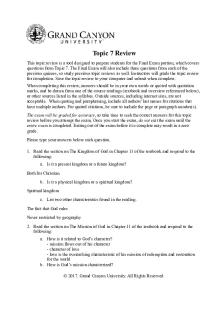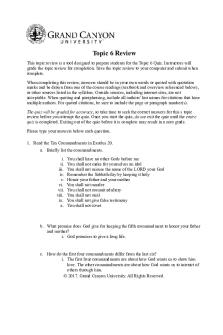CWV 106HN RS T1Knowledge Of God Worksheet PDF

| Title | CWV 106HN RS T1Knowledge Of God Worksheet |
|---|---|
| Author | Mariah McMurren |
| Course | Christian Worldview |
| Institution | Grand Canyon University |
| Pages | 2 |
| File Size | 114.7 KB |
| File Type | |
| Total Downloads | 34 |
| Total Views | 121 |
Summary
Worksheet on the Knowledge of God...
Description
Mariah McMurren CWV-106HN Knowledge of God Worksheet 1. What thinker(s) did you identify or resonate with? Why? What did you find most surprising, interesting, or confusing? a. I feel I resonate most with Thomas Aquinas writing, Of God and His Creatures. When initially reading his work, I had a little trouble understanding what he was saying. However, after reading over a couple times, I felt I could identify with Aquinas most, because of how he described negative differentiation. I thought it was very interesting the way he described our being like God, but God not being like us. It was something I have never heard before, but it makes complete sense to me. 2. What does Anselm's prayer say about the process of knowing God? a. Anselm’s prayer says that the process of knowing God is essential to our being and that it is what we were made to do. The prayer says the process begins with setting apart time for God whether that be in prayer, scripture, etc.. Throughout his prayer, he also begins to ask somewhat rhetorical questions, but questions about God many of us have asked at times in our lives while on a spiritual paths to know God. He later continues in describing how some can stray from their purpose of knowing God but not setting apart enough time for him. 3. How does Aquinas explain the role of reason in knowledge in general and knowledge of God in particular? How does faith relate to reason? a. Aquinas says that we must have knowledge of God. However, we lack some knowledge in order to remain humble and know who we are in comparison to who He is. Aquinas mentions a twofold mode of truth. These being truths within natural reason and truths beyond human reason. We do not have access to these truths beyond human reason, because it helps to strengthen our faith in God. 4. How does "negative differentiation" relate to what Aquinas later discusses as the likeness between God and creatures? Why can it be said that creatures are like God but God is not like creatures? a. Aquinas describes negative differentiation as a key method to “the consideration of divine substance.” This method being our understanding of God to a certain extent, but not beyond a very general knowledge. Aquinas also says that creatures are like God, however, God is not like His creatures. An example of this being: one would not refer to his or her mother as being just like one’s self. However, one can say one is just like his or her mother. God is pure and full of goodness. Since some are full of sin, it does not mean that God has sin even though he made us. 5. What is analogical predication according to Aquinas? How does it differ from univocal and equivocal predication? a. According to Aquinas, analogical predication is that the perfection of God is similar to that of an earthly idea of perfection. However, God’s actual perfection is much greater. Analogical predication differs from univocal and equivocal predication, because univocal predication is saying since one thing can be described as another, they are both the same thing. An example of © 2017. Grand Canyon University. All Rights Reserved.
Mariah McMurren this is since we are made in the image of God, we are God, or God is us. Equivocal predication is something having multiple interpretations of what that something is. 6. Why does Calvin think the knowledge of God and the knowledge of self are intertwined? a. Calvin believes that self-knowledge is never truly attained until one seeks to know who God is. He says that we do not know ourselves until we see how perfect God is. In seeing His perfection, we see our flaws and realize how imperfect we are. Thus realizing who we truly are. 7. How does Calvin think every human bears knowledge of God innately? a. Calvin thinks every human bears knowledge of God innately, because everyone is designed to worship SOMETHING. That something may not always be of the religious sorts and more materialistic; However, everyone searches for something to worship in hopes to fill a void in our hearts. Calvin believes this void is something only God can fill. 8. How does Bernard describe what it means to love God? What are the stages or developments of growth in loving God? a. Bernard describes loving God as meaning to love one’s self because He loves us. There are four stages in the development of growth in loving God. The first stage is man loving himself for his own sake. It is a selfish kind of love. The second stage is loving God for blessings. This is loving the gifts instead of the giver. The third stage is loving God for Him being Him. The final stage is loving one’s self for God’s sake. In the stage, one will better understand who he or she is and realize he or she deserves to be loved.
© 2017. Grand Canyon University. All Rights Reserved....
Similar Free PDFs

CWV 101 RS T7Review Online
- 3 Pages

CWV 101 RS T1Review Online
- 4 Pages

CWV 101 RS T3Review Online
- 4 Pages

CWV 101 RS T7Review Online
- 4 Pages

CWV-101-RS-T2Review-Online
- 4 Pages

CWV 101 RS T2Review Online
- 4 Pages

CWV 301 RS T6Review Online
- 4 Pages

CWV 101 RS T1Review Online
- 4 Pages

CWV 101 RS T6Review Online
- 4 Pages

CWV 101 301 RS T2Origins
- 4 Pages

CWV-101-RS-T1Review-Online
- 3 Pages
Popular Institutions
- Tinajero National High School - Annex
- Politeknik Caltex Riau
- Yokohama City University
- SGT University
- University of Al-Qadisiyah
- Divine Word College of Vigan
- Techniek College Rotterdam
- Universidade de Santiago
- Universiti Teknologi MARA Cawangan Johor Kampus Pasir Gudang
- Poltekkes Kemenkes Yogyakarta
- Baguio City National High School
- Colegio san marcos
- preparatoria uno
- Centro de Bachillerato Tecnológico Industrial y de Servicios No. 107
- Dalian Maritime University
- Quang Trung Secondary School
- Colegio Tecnológico en Informática
- Corporación Regional de Educación Superior
- Grupo CEDVA
- Dar Al Uloom University
- Centro de Estudios Preuniversitarios de la Universidad Nacional de Ingeniería
- 上智大学
- Aakash International School, Nuna Majara
- San Felipe Neri Catholic School
- Kang Chiao International School - New Taipei City
- Misamis Occidental National High School
- Institución Educativa Escuela Normal Juan Ladrilleros
- Kolehiyo ng Pantukan
- Batanes State College
- Instituto Continental
- Sekolah Menengah Kejuruan Kesehatan Kaltara (Tarakan)
- Colegio de La Inmaculada Concepcion - Cebu




